|
|
Broomstick

|
|
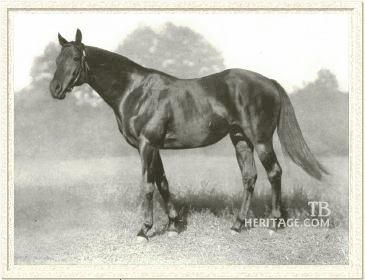 |
|
|
A good, but not great runner, Broomstick became one of the cornerstones
of the great H. P. Whitney breeding program, and as a son of Ben Brush,
carried on one of the strongest American sirelines of the 20th Century.
Broomstick was officially bred
by Col. Milton Young and foaled at Young's McGrathiana Farm, north
of Lexington, Kentucky. The mating that produced Broomstick, however,
was engineered by Foxhall Daingerfield, manager and brother-in-law
to James R. Keene, owner of the great Castleton Stud. The mare *Elf
(by Galliard) had been imported from England as a foal with her dam,
*Sylvabelle in 1893. An unraced mare, in 1900, *Elf was bred to Castleton's
top sire, Ben Brush, but, believed to be barren, was sold at a sale
at Madison Square Garden for a measley $250 and purchased by commercial
breeder Col. Milton Young.
Much to Young's good fortune,
*Elf produced a foal the next spring and as a yearling was sold as
part of a 10 yearling package for $17,000 to coal magnate Captain
Samuel S. Brown of Pittsburgh. The colt, named Broomstick, was small
and matured early. He made nine starts at two, winning his first three
including the Juvenile, Expectation and Great American Stakes, but
tailed off after this. At three, he won six of 15 races including
the Brighton Handicap, setting a new American record time of 2:02
4/5 for the mile and a quarter, a time not bested until 1913, and
then by Broomstick's own son, Whisk Broom II in a time many consider
invalid.
That season, Broomstick also
won the Travers Stakes and Flying Handicap. As a four-year-old, he
won five of 15 starts, but no stakes, competing as he was against
the great Sysonby, who dominated the division. He retired from racing
with 39 starts, 14 wins, and $74,730 and had earned a reputation as
a game competitor who could carry weights.
Broomstick in the Stud
Capt. Brown owned a grand spread
north of Lexington, Kentucky, called Senorita Stud, named for his
favorite mare, on land now occupied by the Kentucky Horse Park. Here
he retired Broomstick to stand at stud to a harem of exceptional mares.
Brown died in 1906, but it took his heirs two more years to decide
to disperse the bloodstock, which was sold on November 23, 1908. On
that day, Broomstick was purchased by Harry Payne Whitney for $7,250
on the advice of his trainer, Andrew Jackson Joyner, who had just
broken a yearling colt from the first crop by Broomstick that he liked
very much. The colt, bred by Capt. Brown (out of the Kentucky Oaks
winner Audience, by Sir Dixon) and named WHISK BROOM II, became a
high class handicapper and broke his father's American record in the
Suburban Handicap of 1913, winning in 2:00 flat, as well as coming
home victorious in the Brooklyn and Metropolitan Handicaps. |
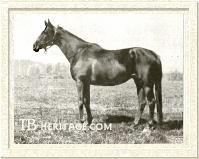
The filly Regret won against the colts
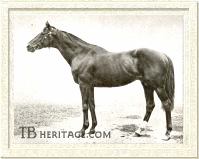
Whisk Broom II, top handicapper and sire of champions
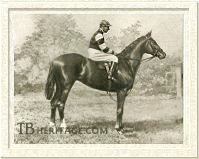 Sweeper II won England's 2,000 Guineas Sweeper II won England's 2,000 Guineas
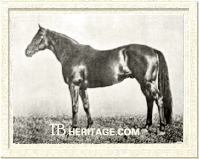 Cudgel was twice champion older horse Cudgel was twice champion older horse
| |
Following the Senorita Stud dispersal,
Broomstick was sent to Whitney's farm, first in New Jersey (Brookdale
Farm, near Red Bank) until 1914, and then moved to Whitney's newly
purchased acreage on the east side of Paris Pike outside of Lexington,
Kentucky, property once the part of the famous Elmendorf estate of
James Haggin.
Broomstick was used sparingly but effectively up until
his death at the age of 30 in 1931, and when WHISK BROOM II was retired
to the same stud, father and son competed for the best mares. When
H.P. Whitney died in 1930, Broomstick was part of the inheritance
of Whitney's son, Cornelius Vanderbilt "Sonny" Whitney.
Broomstick sired 280 foals, 69 stakes winners, the vast majority of which were bred by Whitney. He
was the Leading Sire in America in 1913, 1914 and 1915, and continued
as a top ten sire through 1927. His first three crops sired while
at Senorita Stud included, besides WHISK BROOM II, the Kentucky Derby
winner MERIDIAN (1908 out of Sue Smith by Masetto) and SWEEPER II
(1909 out of Ravello II by Sir Hugo), sent abroad to win the 2,000
Guineas in England.
His very best runner was the
outstanding filly REGRET (1912 out of Jersey Lightning by Hamburg),
also winner of the Kentucky Derby, besides becoming a tremendous handicapper
against males. Broomstick also sired the outstanding runners CUDGEL,
WILDAIR, BOSTONIAN, TIPPETY WITCHET, DR. CLARK, SPOT CASH, TRANSMUTE, and CANTANKEROUS.
Broomstick was truly a sire of
sires. His successful stallion sons included WHISK BROOM II (sire
of champions Whiskaway, Whiskery, Diavolo), SWEEPER II (sire of Golden
Broom), THUNDERER, CUDGEL (sire of Fluvanna, Milkman), WILDAIR (sire
of Canter, Draymont, Potheen), RUNANTELL, TRANSMUTE, BLONDIN (sire
of Advising Anna), BOSTONIAN, BROOMS, and HALCYON.
Broomstick was America's Leading
Broodmare Sire in 1932 and 1933 due in large part to the success of
Whitney-bred Equipoise, out of a daughter of Broomstick. Other daughters
produced Maud Muller, St. Brideaux, On Hand, Brazado, Erin, Gilded
Knight, Traffic Court, King Saxon, Flag Pole, Bunting, Frilette, Elf,
Rosebloom, and Valdina Orphan.
Like his sire, Ben Brush, Broomstick
was small and built on the same long, low lines, producing speed and
early maturity as well as durability and classicity. But Broomstick
wasn't quite as long-bodied as his sire, and had more quality about
him. He also had more of a sloping rump than his sire.
|
Broomstick, who died in 1931
at the age of 30, is buried in the equine cemetery at the former C.V.
Whitney Farm, now owned by Gainesway Farm, Lexington, Kentucky. The
cemetery also includes his son, WHISK BROOM II (who he outlived by
three years), daughter REGRET, grandson Equipoise, and other descendants
Boojum and Counterpoint.
-- Anne Peters |
|
|
|

